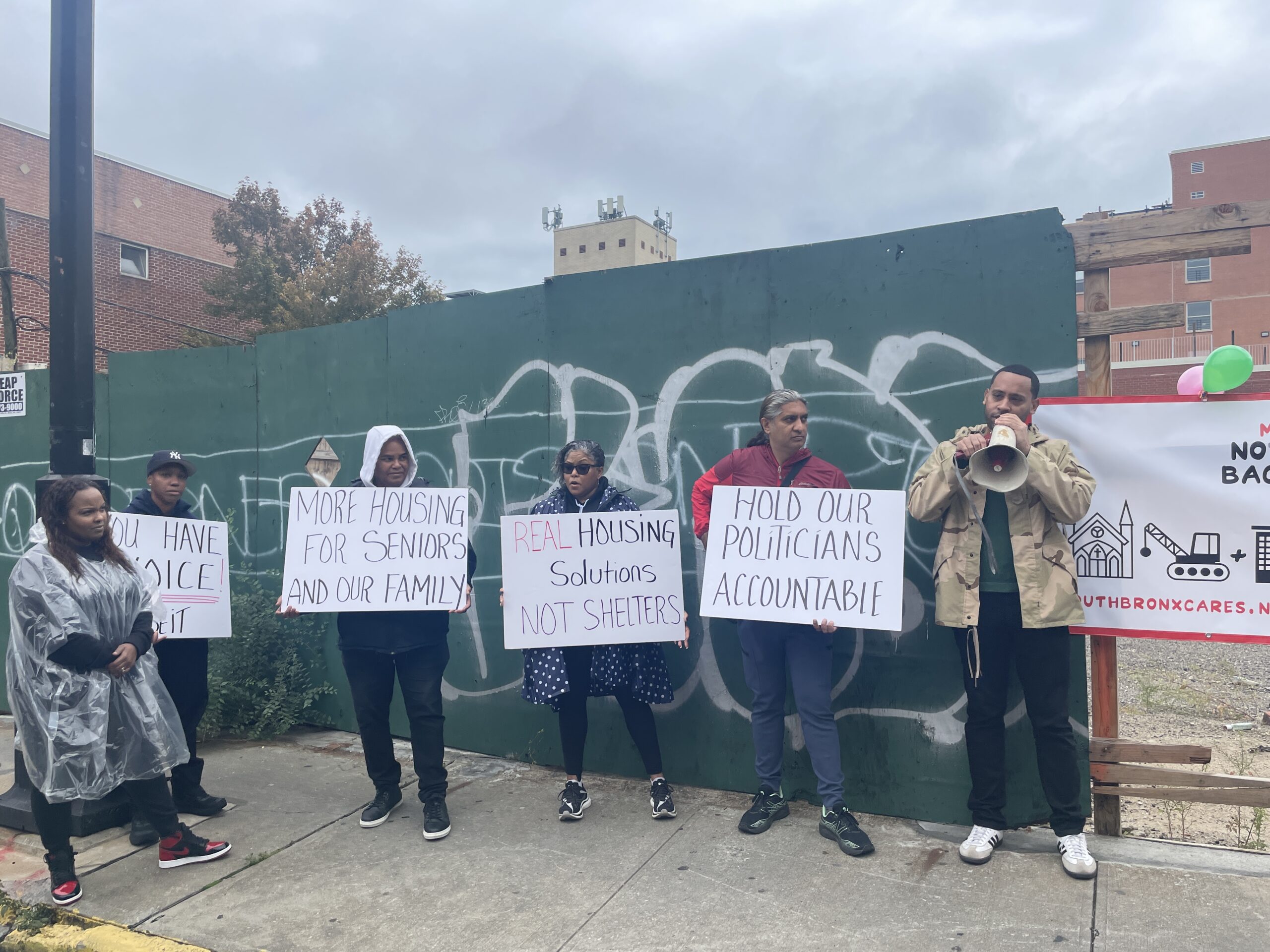Para leer una version de esta historia en español, vaya aquí.
On the corner of Elton Ave and 158th Street in Melrose where a historic church once stood, discarded bottles and socks litter the empty lot as a battle plays out about its future use.
Earlier this year, La Resurrección United Methodist Church was demolished after standing for over 150 years, to the dismay of some community members. According to developers, however, the lot won’t be empty for long – they expect construction to begin on a new supportive housing development in the first quarter of 2024.
Opposition for the project started in earnest in early 2023. A group of neighbors calling themselves South Bronx Cares tried to stop the church’s demolition by gaining it landmark status, but they were unsuccessful. Many now feel betrayed by what they believe has been a lack of transparency.
Arline Parks, the chair of Bronx Community Board 1, told The City in January that developers never met with the community board to discuss the plans, which developers and City Council Member Rafael Salamanca Jr., who has supported the project, deny.
Jessica Clemente, the CEO of the community nonprofit Nos Quedamos, contends that the project doesn’t recognize the unique history of Melrose Commons as an international case study in community planning, economic revitalization and self determination.
Nos Quedamos spearheaded an urban renewal plan that was adopted into the city charter in 1994, which prioritized affordable home ownership and sustainability. Clemente said that using public funds on a project that doesn’t engage with a community-led planning process threatens the work that Nos Quedamos began.
“These plans to bring in the development undermine that principle and that process,” said Clemente. “We want to make sure the work of the community that was done 30 years ago is not undermined by rezoning or haphazard planning that doesn’t include the community and that takes away from what was accomplished here in Melrose.”
The planned building would contain 10 stories of single unit housing. Most of the surrounding buildings are only three to six stories tall. The Jericho Project, the nonprofit organization that is set to jointly operate the project with Azimuth Development Group, has said that 60% of the units would provide supportive housing for those facing homelessness, and 40% would be designated as affordable and low-income housing.
Community members are concerned that the development eventually will become a shelter or function as one, due to the planned single unit housing, and note that their neighborhoods have long been unfairly selected as sites for homeless shelters. According to city data, Melrose’s Community District 1 has 15 homeless shelters, while Community District 8 – containing wealthier Bronx neighborhoods like Riverdale – only has two, both for families with children.
“We’re open to affordable housing,” Rahim Kassan, 49, said. “But we want families.” Kassan has lived in the immediate neighborhood of the planned housing development since 2018. The Jericho Project has provided supportive housing for families in the past, but according to CEO Tori Lyons, the need for supportive housing for single adults is much higher.
Salamanca had said the housing development would include “set aside” housing for veterans – something contested by members of South Bronx Cares. Jericho’s Lyons clarified that housing policy prevents any apartments being exclusively designated for veteran use, but said Jericho had agreed with Salamanca’s office to internally prioritize veteran referrals for the project.
“To characterize this project as anything other than what it is – much-needed permanent housing – would be blatantly disingenuous,” said Salamanca.
Early in October, South Bronx Cares hosted a rally against the housing development. The march began in front of the lot where the church used to be, proceeded south, and looped around back to Yolanda Garcia park.
Marchers chanted “No more in my backyard,” a reference to accusations of NIMBYism they have faced as they opposed the project. NIMBY stands for “Not In My Backyard,” and describes an ideology often associated with wealthy homeowners who reject developments that they believe will drive down property value in the neighborhood.
Michael Rodriguez, a 36-year-old Melrose resident and organizer for South Bronx Cares, said that the group feels insulted by claims of NIMBYism.
“These programs have been here for a long time.” said Rodriguez, referring to the neighborhood’s existing homeless shelters. “It isn’t like we’re strangers to them, we’re not. But when you continue to put so much in one place, enough is enough.”
Lyons said that Azimuth and the Jericho Project have attempted to address community concerns, including changing the building design to “be more contextual” with the surrounding neighborhood.
“They’re banking on the fact that we don’t care, we don’t show up, but we’re trying to change the narrative,” said Ayan Wilson, a 46-year-old daycare owner and mother who raised two children in the neighborhood. “We show up and we care about our neighborhood, just like Riverdale would care about their neighborhood.”
South Bronx Cares is not giving up. According to Rodriguez, the neighborhood group is already planning more protest rallies.

